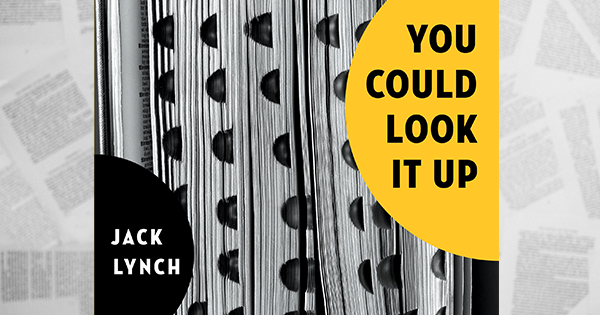
Little did Hammurabi suspect, when his Code was first carved onto a four-ton black pillar, that 3,770 years later civilians would be able to carry it around in their pockets. In the dawn of the smartphone era, millions of reference texts—from the Domesday Book to Wikipedia—are readily accessible with a swipe or a click. Even the Encyclopedia Britannica has gone entirely digital.
But whether literal stone or figurative tablet, the reference shelf has remained a pivotal part of our lives. Jack Lynch’s new book, You Could Look It Up, is an ode to encyclopedias of all shapes and sizes. Each of its 25 chapters pits two books against one another (like Theophrastus and Pliny’s respective natural histories, or A Short Treatise on the Game of Whist and Wisden Cricketers’ Almanack). Wedged between these are short essays on varied subjects, such as the book-organizing principles of famous figures or lost encyclopedias like the Yonglè dàdian.
Chapter 9 ½, “Ignorance, Pure Ignorance: Of Omissions, Ambiguities, and Plain Old Blunders” introduces a favorite topic among book critics: errors. Reference texts of any kind can be awe-inspiring, daunting, and humbling—and often wrong, as critics love to point out. In 1728, Ephraim Chambers tried to forestall criticism in the preface to his Cyclopedia: “For Errors, they cannot be very few, considering the Hands thro’ which most Parts of our Knowledge have passed, and from whom we are obliged to take our Accounts … What one Author, upon the most particular Subject, will you produce, that has not his share of ’em?”
The first really great English lexicographer, Samuel Johnson, knew this better than most. Lexicographers, he explained, can never hope for actual praise; the most they can hope for is “to escape reproach”—but “even this negative recompence has been yet granted to very few.” His prediction was accurate: his own dictionary was widely criticized for its mistakes, the most famous of which concerned his definition of the word pastern. The pastern is actually the part of a horse’s foot between the fetlock and the hoof, but Johnson’s entry reads, “The knee of an horse.” At least he was forthright about it. “A lady once asked him how he came to define Pastern” that way, recorded James Boswell. “Instead of making an elaborate defence, as she expected, he at once answered, ‘Ignorance, Madam, pure ignorance.”’
Ignorance led Johnson into some of his other errors. Although windward and leeward are antonyms, for instance, Johnson defined them identically, as “Towards the wind.” But other failures in defining apparently came from his knowing too much. Readers informed that a coughis “A convulsion of the lungs, vellicated by some sharp serosity,” or that a network is “Any thing reticulated or decussated, at equal distances, with interstices between the intersections,” come away knowing little more than when they began.
Errors come in many varieties. Some entries are bad because they tell us nothing. John Kersey was a master of the non-definition definition: his New English Dictionary (1702) defined fork as “a well-known instrument,” cat as “a well-known creature,” and dog simply as “a beast.” Here are two more entries in their entirety:
Ake, as, my head akes.
An Apron, for a Woman, &c.And while Benedykt Chmielowski deserves full credit for writing the first Polish encyclopedia, Nowe Ateny albo Akademia wszelkiej sciencyi pełna (New Athens; or, The Academy Full of All Science), in 1745–46, his no-nonsense entry for horse—“Koń—jaki jest, kaźdy widzi” (“Horse: everyone can see what it is”)—is still proverbial in Polish.
Copyright 2016 Jack Lynch. Reprinted with permission of Bloomsbury Publishing.

